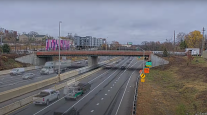Staff Reporter
Connecticut DOT Unveils $9.7 Billion Transportation Investment Plan

[Stay on top of transportation news: Get TTNews in your inbox.]
The Connecticut Department of Transportation released its $9.7 billion capital plan, which includes investments across various modes of transportation over the next five years.
The plan, which covers fiscal years 2021-25, includes investments for repairs and upgrades across multiple modes, such as highways, bridges, public transit and bicycle and pedestrian facilities.
CTDOT anticipates using $2.1 billion in plan funding in fiscal 2021, which began Oct. 1. Of this, some $800 million will be directed to bus and rail needs, while $1.3 billion will support highway and bridge infrastructure. According to the American Road and Transportation Builders Association’s 2020 bridge report, 6.3% of Connecticut’s bridges are classified as structurally deficient.
“Ongoing maintenance and upkeep of our existing infrastructure, combined with strategic, thoughtful investment in projects that reduce congestion, improve mobility and efficiency, and minimize our environmental impacts are critical to keep Connecticut moving forward and competitive in the future,” CTDOT Commissioner Joseph Giulietti said.
Over the five-year plan, $5.9 billion will support highway and bridge projects, $3.5 billion will go toward public transportation and $245 million will be directed to other facilities.

Sustainable trucking is here. In this episode, we'll talk to two major players in the transportation technology sector that are helping fleets move closer to total supply chain sustainability. Hear a snippet, above, and get the full program by going to RoadSigns.TTNews.com.
Highway and bridge projects outlined for fiscal 2021 include replacing a bridge that traverses a rail line in Stratford and replacing a viaduct on Interstate 84 in Hartford. Running across the state from the southwest to the northeast, I-84 bisects Waterbury and Hartford. According to the Capitol Region Council of Governments, about 141,700 vehicles travel on I-84 in downtown Hartford every day.
The department also plans to advance the corridor study for I-95 between New Haven and Rhode Island. I-95 runs across the southern edge of Connecticut, forming a link between New York and Boston. In fiscal 2021, CTDOT plans to begin resurfacing work on I-95 in Norwalk, which is in the southwest corner of the state.
Projects intended to reduce the transportation sector’s carbon footprint include the installation of electric vehicle charging stations, starting the conversion of the agency’s fleet to electric vehicles and the acquisition of battery-powered electric buses for transit operations.
“Our five-year plan demonstrates our commitment to responsible stewardship of our existing transportation network,” Giulietti said, “while targeting much-needed upgrades to our roads and bridges, our growing transit system and healthier, eco-friendly nonmotorized options.”

Giulietti
The plan’s projects are financed with state and federal funding. In the past, federal dollars made up 70-80% of the department’s capital program. However, in recent years, this balance has shifted with an influx of state bond funding.
In the announcement, Giulietti noted that funding for long-term improvements remains a challenge.
“As we roll out our program, we will remain focused on delivering projects on time and on budget,” he said. “We cannot lose sight of the fact that long-term funding for continued critical investments in our transportation infrastructure is very much uncertain.”
Transportation funding has been a source of contention in Connecticut for the past couple of years. Gov. Ned Lamont had proposed truck-only tolls, which he stopped pushing for in February 2020 after repeated delays from lawmakers to convene for a vote. Connecticut’s neighbor, Rhode Island, maintains a truck-only tolling system, which the industry continues to fight in court.
Want more news? Listen to today's daily briefing:
Subscribe: Apple Podcasts | Spotify | Amazon Alexa | Google Assistant | More




